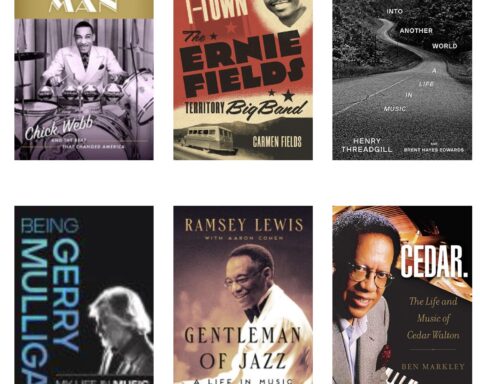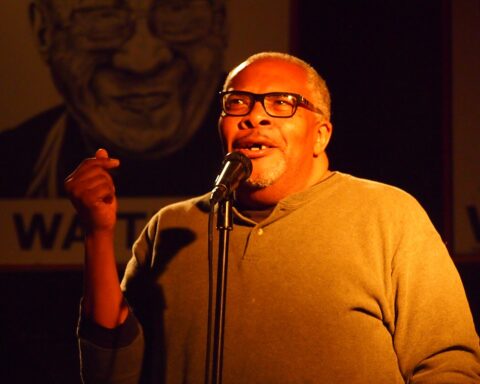To Mark Stryker of the Detroit Free Press, writing about jazz has always been important — and he has a real audience since Detroiters are very serious about the music.
 Though Detroit is not the city he would necessarily move to if he were trying to make it as a professional musician, he asserts that it is possible to grow there as a musician, to develop one’s craft. Stryker talked about his job and music in Detroit in an interview during the Detroit Jazz Festival:
Though Detroit is not the city he would necessarily move to if he were trying to make it as a professional musician, he asserts that it is possible to grow there as a musician, to develop one’s craft. Stryker talked about his job and music in Detroit in an interview during the Detroit Jazz Festival:
Emilie Pons: Mark, tell me a little bit about what you do here.
Mark Stryker: I do a weekly column that covers what’s happening in town on jazz and classical music. Every three weeks I have a record review column where we cover jazz and classical music. I write major profiles of jazz musicians that come into town that we think are important, so people from Ornette Coleman to Dave Holland to Sonny Rollins to Vijay Iyer, etc. Some of these are major profiles, others are shorter kinds of pieces that might be just short interviews kind of stories and we mix all that in.
Jazz is only a part of what I do. I’m not sure exactly what the percentage is. My main job at the Detroit Free Press is to cover classical music as a beat writer and a critic and then my other duties at the Free Press are to cover visual art, broad-based cultural news, arts and cultural news, and jazz. So we fit it in as best we can because jazz is a passion of mine. It’s my background, I grew up as a jazz musician. From the time I came here 16 years ago I made it a point to carve out a niche to write about the music as often as I can, and over the years, because of the response we’ve got and because of the way jazz coverage continues to resonate with this community and the importance of music broadly speaking, particularly African-American music, to Detroit, the editors at the paper understand that having jazz is an important part of the mix of what the paper should do.
So I’m lucky in that I have support all the way up to the editing chain for what I do. Having said that, I have to make sure I do everything else I am supposed to do, at the highest level possible so nobody says to me “You know, we think you’re spending too much time writing about jazz because we need you to do more of this . . .” It’s only because I do all the other stuff, keep it together, that [I can] indulge this expertise and love and that then gets reinforced because the editors see how valuable readers see that coverage.
Pons: Are readers in this city more responsive to this kind of coverage than they might be in some other Midwestern cities?
Stryker: No question. The history here is so remarkable: when you go hear jazz in this town, you are sitting next to people in the audience that grew up with Barry Harris, Tommy Flanagan, Charles McPherson . . . they went to high school with those guys. And you’re sitting next to young musicians who are happy [to live] in a place where they’re part of that legacy. So readers here are grateful, and they are starved for coverage of the music that they love. And there are very few things in life that people feel more passionate about than art and in particular music, so when you touch somebody by writing about what they love, it means something to them.
Pons: If you were a jazz musician, would you come to Detroit to live and make a living here?
Stryker: If I’m a musician, I don’t think this is the place that I would necessarily move to. If I’m looking at should I go to Chicago, should I go to New York, should I go to Los Angeles to try and put down roots, I don’t think I’m gonna come to Detroit. But while this is not necessarily a place where, if you are a young musician on the East Coast or the West Coast, you would think about moving to, this is a place where musicians who are from here — and we continue to cultivate remarkable young talents — can stay and soak up the history and work on their craft and find themselves musically. So this is not a place that pushes away its young talent that has to go somewhere else. That’s a different issue [as to] whether or not [it is] a place that can actually attract people from elsewhere.
Young kids who go to school at the University of Michigan and study with Geri Allen or Bob Hurst, or go to Michigan State University up the road in East Lansing and study with Rodney Whitaker, those kids will often stick around for a few years, working, practicing, trying to hone their craft, starting bands and beginning to create careers for themselves. And you can do that here still very well in Detroit. It’s not a place where the moment you graduate from school or the moment you get to be old enough to leave the house you have to move somewhere else. There is enough of a scene here that it can sustain people as part of how they are piecing it together when they are in their twenties.
Pons: How do you feel about the quality of the music and the response from the audience in a New York venue?
Stryker: On some level, when you hear a great band playing at a sympathetic club in New York like the Vanguard, it is unparalleled. But a lot of the clubs in New York are tourist-trap kind of places and you are not treated all that well, the sound is not that great, you go and you feel like you’ve spent your entertainment budget for the month just to hear one set of music. That’s what it is. I will say this about the audiences: there are no audiences in the country like there are in Detroit for jazz. It’s an incredibly informed, engaged audience that feels this music as deep in their soul as they feel anything. And you don’t see that very often.
In New York often you are sitting among tourists or you’re sitting among folks with the money to afford $30 cover charges and $10 minimums and it’s different. Jazz music is not a living, breathing part of their lives as much as it is here in Detroit. Obviously there are great audiences in New York that feel this music as deeply as folks do here, but talk to musicians, they will tell you: there is nothing like this audience. Because they’ve seen it all, they’ve heard it all and yet they’re not jaded in any way. They’ve seen it, they’ve heard it, but they can’t wait to hear the next story from the bandstand. And they want to be moved. They’re not sitting there in the audience with a chip on their shoulder saying, “Prove something to me,” as you find not just in New York but also in other cities.
Pons: It feels like here jazz is at home. And it feels like jazz musicians are coming back home when they’re coming here.
Stryker: Detroiters are intensely proud of their city. And they are very defensive about their city. This city has been beaten up in the national press for many years; a lot of our wounds here are self-inflicted, no question. But the people that are from here believe in the city and the jazz musicians from here know that they’re part of a unique lineage. It fuels their desire to prove to the world that they come from a very special place.






It's always interesting to be sitting on the other side of the tape recorder. Thanks to Emilie for the conversation.
I do want to add that the single best thing about writing about jazz in Detroit has been the opportunity -- privilege, actually -- of helping to chronicle the city's extraordinary jazz history and writing in-depth pieces about so many of the key musicians to emerge from here, from Barry Harris, Tommy Flanagan, etc., to the more recent exports. It has been especially gratifying to share the stories of these remarkable musicians with the everyday readers of a large metropolitan newspaper. I hope the coverage reminds local readers that they are living on hallowed cultural ground, that the jazz tradition here remains a living, breathing and ongoing concern and that jazz belongs at the center of mainstream cultural life rather than shunted off to the fringes.